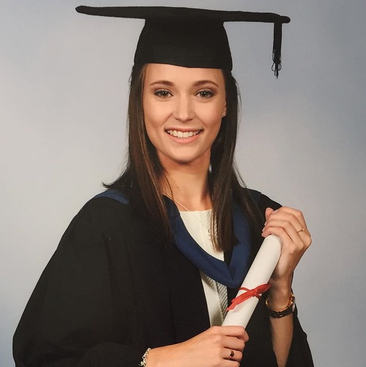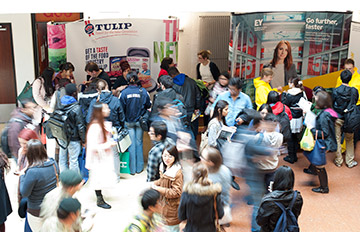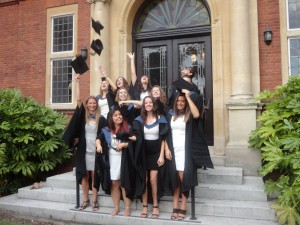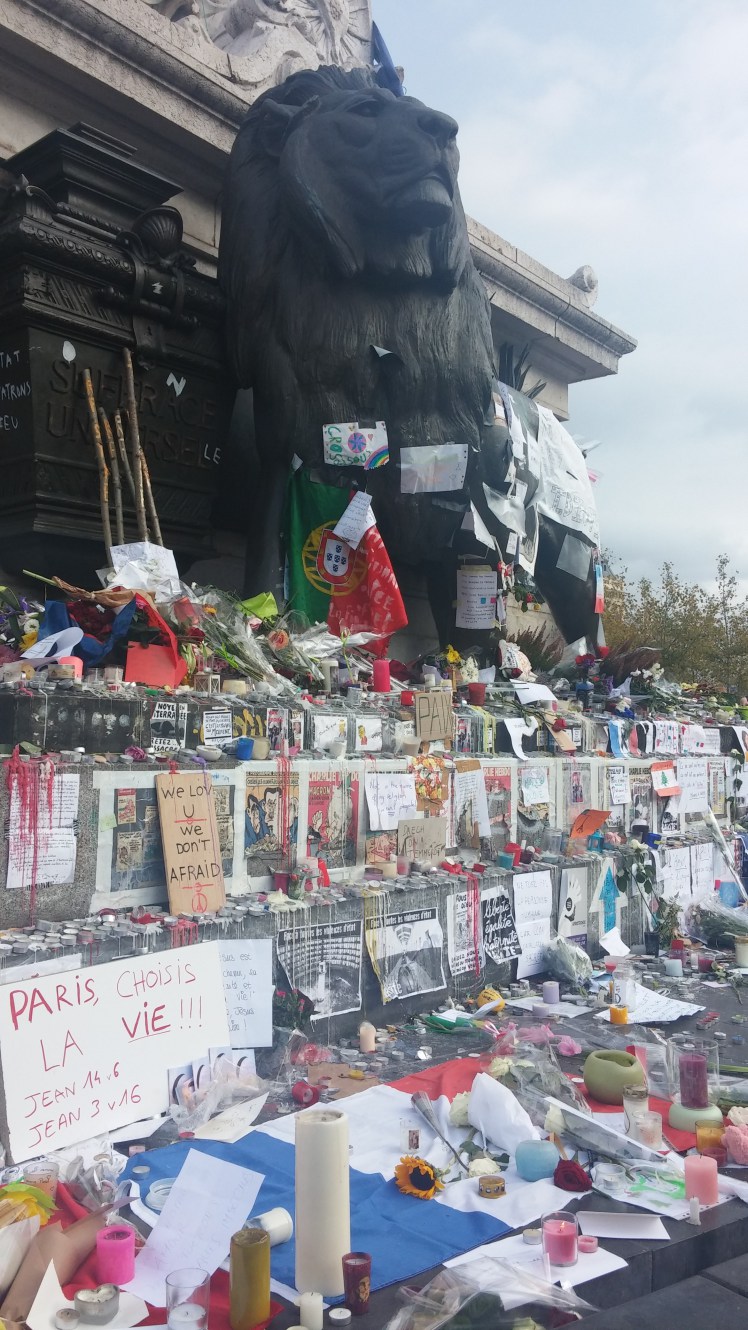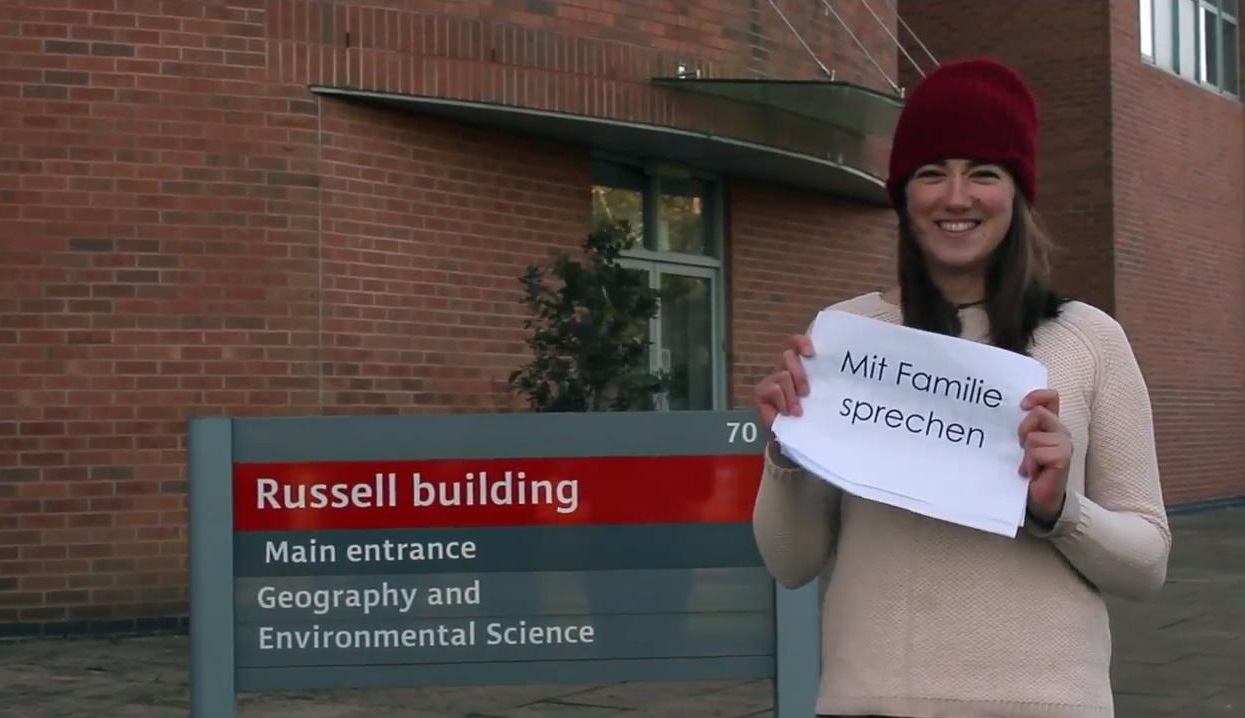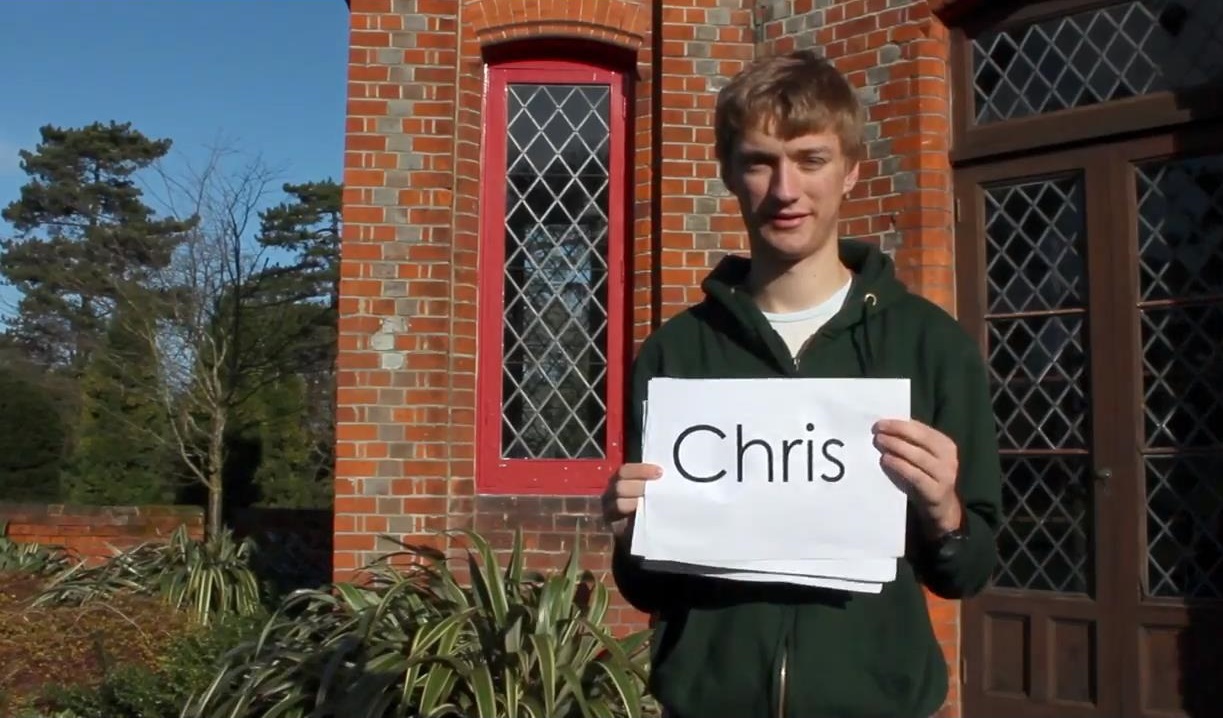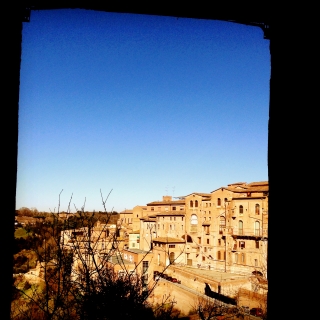Category Archives: Student Life
Outstanding Contribution to Teaching Excellence Award won by Italian Studies at Reading
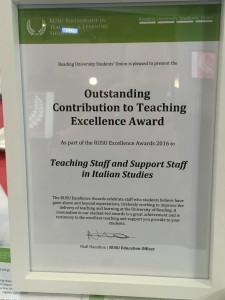
Over the past few weeks, RUSU has been running the RUSU Excellence Awards. These are teaching awards which aim to recognise members of University of Reading staff who the students believe have gone above and beyond their expectations, tirelessly working to improve the delivery of their teaching and learning experience.
A special nomination for the entire Italian Department was received and the effort and detail that the Italian students went into to nominate their entire cohort of staff could not be overlooked!
A nomination is a great achievement, and is testimony to the hard work you put into improving the experience of students here at the University. Your efforts have not gone unnoticed!
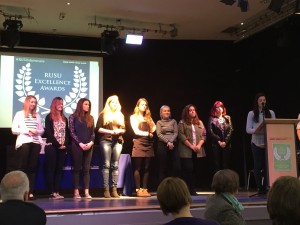
Some comments that students have made in their nominations:
‘We’ve enjoyed a huge variety of learning styles and approaches – but ultimately they all share the same values and that’s helped to create a really strong foundation for our degree’
‘They’ve created a space both formally and informally where students feel they can be listened to. They’ve done this informally by having an open-door policy, treating us as individuals and always being approachable
‘We all studied abroad in our third year and we’re so thankful, especially to the admin team, for being a support structure when things occasionally went horribly wrong at our visiting institution; undoubtedly their support saw us through the entire experience ‘

The German Drama Group
Three students of German Studies, Katie Fountain, Chris Flach and Steph King departed on a journey of the unknown and joined the German Drama Group in September 2015. During that journey, they haved experienced a new style of drama, including physical theatre, dance and movement, while improving their German language skills.

This is what Katie Fountain, second year student of German and Italian, is saying about her experience: “The play is devised by DAAD-Lektorin Sandra Beer, who has a background in Performance Studies and encouraged us to think of creative and ambiguous ways to portray various themes such as love, social media and isolation. For me, it has been an enlightening experience to experiment with new theatrical methods.”
Chris Flach adds: ”As someone who only had experience with traditional theatre, the German Drama Group provided me with an exciting new challenge. The elements of physical theatre and dance have been fun to experiment with and have given me a new perspective on theatre as a whole. All this while improving my German speaking skills!”
 Steph King says: “ Before the beginning of this project, I had never taken part in any serious drama work so it has been a new and interesting experience for me. It has been a pleasure working and coming up with creative ideas with the team. I hope everyone else watching will enjoy it as much as we have putting it together!”
Steph King says: “ Before the beginning of this project, I had never taken part in any serious drama work so it has been a new and interesting experience for me. It has been a pleasure working and coming up with creative ideas with the team. I hope everyone else watching will enjoy it as much as we have putting it together!”
After the first few months of workshops, it became clear that ideas were merging into what looked like could evolve into an innovative and entertaining performance. Having experimented with different texts and topics during the workshops, we discovered that the effects of social media and technology on society, particularly in our generation, captured our imagination. Therefore, we wanted to further explore the effects of modern technology on the individual and interactions with others through elements of dance, music, media and language. Loosely based on the story and central themes of Faust by Goethe, two individuals find themselves lonely and dissatisfied with life and searching for love in the 21st century. Pushed together by unknown forces, they soon realise that nothing is what it seems.
If you would like to embark on our adventure and are curious, get connected with us and come to our performance #Disconnected, which will take place on 22 March at 7.45pm in 3Sixty.
A taste of studying French at Reading University
On Thursday 11th February we hosted four A-level students from various local schools and gave them a taster of undergraduate study at Reading. The opportunity arose from the mentoring scheme of which Eliza (pictured giving a presentation) is part. Such schemes are vital because, alongside imparting knowledge to our own students, we aim to encourage more school pupils to apply for modern languages at degree level. Not just for the sake of our own careers, of course, (I’m really hoping for an academic job at the end of my PhD) but the UK economy does really need language speakers. Language skills deficit costs the UK £48bn a year. Plus, a modern language degree is such a great way to broaden the mind. Anyway, enough of the shameless plug!
The four A-level scholars were invited to attend a final year French Caribbean course run by Julia Waters. As a doctoral researcher, I have been assisting Julia on this course since October and was thrilled to hear that we would have the chance to inspire some young minds. Julia started the class with an introduction, aimed at the scholars, to the legacy of slavery in Caribbean society, French dominance, the importance of the search for identity in postcolonial Caribbean literature, and the concept of Postcolonialism. The four finalists then took to the floor with an enthusiastic and insightful presentation on Patrick Chamoiseau’s L’esclave vieil homme et le molosse, the story of a runaway slave in Martinique. I was personally very pleased with their efforts after assisting them with planning the presentation the week before.
After the presentation, the scholars departed for their campus tour and the seminar carried on as usual. We wish them all the best with their A-levels and hope the experience inspired them to apply for Modern Languages degrees. I also hope they bear Reading in mind during their applications and, who knows, I could be teaching them postcolonial literature one day!
I found a job doing exactly what I wanted to do!
We’re really proud of the work that our graduates do after they leave the Department of Modern Languages at University of Reading. In the coming months, we’ll feature stories from some of our former students in order to highlight the wide variety of careers that our alumni pursue. It’s clear that a degree in Modern Languages could be the key to a career that could take you anywhere in the world.
This month, we asked Joely Justice, who graduated in 2015 with a degree in French and Italian, to tell us about her new career in translation:
“I began studying Italian at the age of 14, at which point I’d already studied French for 2 years. From then onward I knew I wanted to pursue a career in languages, and more specifically in translation. After all that time, I still haven’t changed my mind. That’s what led me to apply for the job I’m doing today.
I work for the Eurofile department of RWS Group as an Intellectual Property Services Co-ordinator. The job is a project management role, and involves managing the process of the translation of European Patents into European languages, as well as the national validation of these translations in Europe. On a daily basis we process any new orders from our clients, send the documents to be translated out to freelance or to in-house translators and deal with any queries from either the translators or our clients.
The best thing about this job is that I get to use my languages; I mainly use French as I deal with French clients and translators every day, which is great. I didn’t know I’d be able to be using my languages so much in my first job after graduating.
I found my job by signing up to receive emails from different websites. On applying for the job I went through an agency called Park Street People, which was really helpful as the lady I spoke to arranged everything for me and gave me advice for the interview. I was doing my final exams at the time, so it was a real help and a relief to have some guidance at such a stressful time!
During my final year, a representative from RWS came to a University of Reading Careers Fair, where several individuals from different companies came in and spoke to us about their companies and the kinds of careers we could pursue as a language graduate. Of course, since I have always wanted to work in translation, I was mainly interested in RWS Group. It was a great opportunity and I hadn’t realised before that I could do a project management role so soon after graduating.
The careers events that were put on were really helpful and it was inspiring to see how many different routes there are to follow with a language degree. It is especially beneficial if you’re not entirely sure what you want to do, as you
can see all of the possible alternatives and explore your options. The University really helped by putting on these careers events.
I would definitely recommend going to as many of these events as you can during your time at Reading and to make the most of these opportunities, as they are always insightful and helpful whether you know exactly what you want to do or you’re undecided.
The support we receive from the Department of Modern Languages and European Studies at the University of Reading is amazing, not just academically but also on a personal level. Our lecturers were always passionate in their teaching and were always there to support and encourage us.
I found a job doing exactly what I wanted to do so soon after leaving university and I will always be grateful to the department and to the university for giving me the opportunities that they did.”
It’s wonderful to hear stories like Joely’s. They make clear that a degree in French, German, Italian, or Spanish at Reading offers promising career prospects in so many different fields .
If you’d like to find out more about a career with RWS, you can contact Joely at joelyjustice@hotmail.co.uk. To learn more about the many career opportunities for students of languages, be sure to follow our blog, like us on Facebook, and subscribe to our Twitter feed, so that you can keep up on all the news and events of the Department of Modern Languages and European Studies at the University of Reading.
If you’re a Reading graduate, we’d love to hear from you about your career choices after university. Tell us your story. The University of Reading publishes alumni profiles online. If you’d like to share your experiences, all you have to do is fill out an online questionnaire.
When you do, please consider submitting your story for the “Meet a Reading Graduate” section of the blog of the Department of Modern Languages and European Studies.
If you’d like to tell us where your Reading degree has taken you, and perhaps to share a few memories of the department, please get in touch with our Alumni Officer, Dr Veronica Heath. And please consider joining the University’s Thrive Mentoring Scheme to help our students make their transition into the world after graduation so that you can help more students like Joely find a job doing exactly what they want to do.
German Academic Exchange Service Scholarship Winners
Every year, the DAAD (Deutscher Akademischer Austauschdienst/German Academic Exchange Service) is offering scholarships for summer courses at universities in Germany. The courses available focus on topics in German language and literature as well as various other subject areas.
 With the support of our DAAD-Lektorin Sandra Beer, six of our German Studies undergraduate students were successful to receive one of the prestigious scholarships from the German Academic Exchange which enables them to study at a German university for 6 weeks: Stephanie King (year 2), Roisin Forde (year 1), Lauren Davies (year 1), Meili Ellison (year 2), Jonathan Hornby (year 2) and Katie Fountain (year 2) [from left to right]. Congratulations to all of you!
With the support of our DAAD-Lektorin Sandra Beer, six of our German Studies undergraduate students were successful to receive one of the prestigious scholarships from the German Academic Exchange which enables them to study at a German university for 6 weeks: Stephanie King (year 2), Roisin Forde (year 1), Lauren Davies (year 1), Meili Ellison (year 2), Jonathan Hornby (year 2) and Katie Fountain (year 2) [from left to right]. Congratulations to all of you!
Reflecting on Paris attacks by Gemma Dutton (French and Economics student on her year abroad in Paris)
On the 13th November 2015, people from all walks of life were out enjoying a Friday night – drinks on the terrace, watching the football game or enjoying a live heavy metal concert.
On 13th November 2015, Paris was victim to a wave of coordinated terrorist attacks leaving 130 dead and hundreds injured.
On 13th November 2015, France became the centre of international thoughts, not forgetting those in Beirut, Baghdad, Syria, Ankara, Nigeria, the list goes on…
My mum rang me just after 9pm “There’s a madman, you’re home aren’t you!? Oh my god Gemma don’t go out!” I reassured her and put the news on. Paris is a city and, as awful as it sounds, there’s always something going on. We stayed on the line for a while before she hung up to tell people at home that I was ok.
This is a re-post, to be redirected to the original post click on the image below.
Student Life: The German Video Project
As part of the language module in the Second year of German Studies, students created videos about studying and living in Reading for students at the University of Paderborn in Germany. DAAD Lektorin Sandra Beer established contact with lecturer Mirja Gehring from the University of Paderborn, who sent us a video with questions from her students about student life in Reading. Reading students were extremely creative and enjoyed this alternative method of assessment which resulted in brilliant films about being a student in Reading.
Paderborn students enjoyed watching the videos and chose their favorite ones, one of them being the video created by Chiara Derecque and Shriya Keshvara. This is what Chiara and Shriya tell us about their video:
The two of us have very much enjoyed the process of creating our video, despite the technological and meteorological difficulties! We were both extremely determined and motivated to make a good and interesting video, as we had the opportunity to show and talk about our University, which is something that we have a lot of knowledge about, as it’s a part of our daily life. It was also the first time that we were given the chance to do something with a creative focus for an assignment, which is something that we both appreciated.
In our first planning stages we selected around five questions from the German students in Germany, which we wanted to discuss in our video. We then planned how each of us can answer the questions whilst keeping the audience entertained, which was done by constantly changing the scenery and background. For us it was important that our video is perceived as dynamic and entertaining, thus, showing off our creative sides. We wanted to create a well produced video to show our audience how proud we are of studying at the University of Reading. Our aim was to give our audience a genuine insight into our student lives, as we took our audience not only around the University but also around the town of Reading. We showed the parts that we thought were the most important and scenic on campus, such as student accommodation, the Henley business school, the Humss building, and our students union.
If you’ve ever been to England you would know that the weather is quite the opposite of predictable, and it just so happened that on all of our filming days, Reading was windy, grey and cold. However, we didn’t let this affect us too much, as we thought it represents the true colours of England and that it’s not somewhere where you can catch a tan! To soften the harshness of the windy sounds on the video, we played around with the sound frequency on iMovie (the software on which we edited the film). This was a life saver for us and helped maintain a consistent and clear sound of our voices throughout the video, therefore helping to exceed the high quality of our video.
We found that adding special effects, such as speeding clips up, transitions and additional music, contributed to making our video lively, which was something we definitely wanted to achieve. We also thought that our choice of song, ‘Walking On Sunshine’ was a brilliant touch of irony due to the fact that the sunshine was clearly absent! Additionally, to that, we thought that the song choice represented the atmosphere of our University rather well, as despite the weather constantly being gloomy, our campus remains green, joyful and cosy- a wonderful place to call home.
Another video that Paderborn students particularly enjoyed was filmed by Chris Flach and Stephanie King.
Student Life: A Year Abroad in Siena
In their third year at university, students in the Department of Modern Languages and European Studies at the University of Reading go abroad to live, study, and work. They head to France, Italy, Germany, Austria, and Canada; soon they’ll also be going to Spain and Latin America as well. We’ve asked some of the students who have just come back from their year abroad to let us know how they found the experience. Here’s a reflection from Elliot Reeman, a final-year student of French and Italian, who has some advice for those of you getting ready to set off on your adventures abroad:

Our weekend road trip to Castiglione Del Lago with our Italian friend, Beatrice. An amazing weekend filled with bbqs, swimming, taking her boat out on the lake etc. So memorable.
Firstly, I hope this post will serve to comfort, inspire, or at the very least deliver insight to those either contemplating or preparing for a year abroad. I had access to information from former language students prior to going abroad, and I really do believe that every bit of advice/knowledge is valuable.
I’ve never actually ‘blogged’… so I guess I’m just going to outline my experience and try to highlight things I learned to avoid, things I learned NOT to avoid and the best ways to make a super memorable chapter of your lives, because (for the record), I had an incredible time in Siena. I really did.
My mobility to Siena was the second of my two study placements (as I also study French), and was a period of five months between the 10th February and the 10th July.
I was very lucky with many aspects of my time in Siena which helped with my arrival and which positively impacted on my experience in general. A close university friend of mine who studies single honours Italian at Reading was to spend her entire year abroad in Italy (Siena), and this meant that she had settled herself in Siena 5 months prior to my arrival (whilst I was in France). Through her, I was able to fill a room in the same apartment building which a student left, presumably having only spent the first half of their mobility in Italy. I was given the contact details of the landlady in advance and this was all confirmed well before my arrival. I suppose this is exactly why having information, such as posts on this blog and points of contact, is so important and valuable. With people and their information readily available, you’re so much more likely to find something or someone to make your transition smoother and easier.
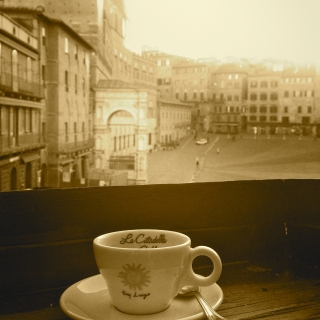
This cafe in the Piazza offers customers their balcony. A perfect spot for a morning espresso whilst watching the people go about their days. It’s funny… the whole town seems to adopt the same care-free pace of life here – so refreshing.
In the six minutes spent in the taxi from the train station, going through the old, narrow, cobbled streets of what was to become my new home-town, I made up my mind that I had chosen well and that I was going to thoroughly enjoy my time here.
The only type of person who I can imagine not enjoying Siena is someone who needs huge, busy cities. Siena has enough charm and character to last you a lifetime. Just a look at the view from my apartment window should give a clue – and this is completely standard view for an apartment in Siena!
There is so much intriguing culture in Siena, the likes of which I can almost guarantee you won’t have come across, and being a resident as opposed to a tourist, it makes you feel an actual part of something so special. I realise I’m not actually explicitly describing said culture, but that’s because I don’t think I can. You simply have to experience it. I will say this: the town’s medieval history can be felt (and often seen) in every street within the walls. Imagine having your breakfast interrupted by the sound of drums, only to get up and look down onto the street from your window and see the whole street filled with men dressed in medieval armour and carrying pikes… well, this happens in Siena.
I could write for days about the things I did and saw (and ate) in Siena, so I’m really trying hard to condense. For this reason, I am going to switch to a list. Call me lazy, but I’m saving your scrolling finger. I just want to highlight the things I believe you should do, and those you shouldn’t:
1: GET A MAP – a good one! Whether it’s Tuscany or any other region, give yourself a real sense of where you are in relation to your host country. Not only will this save potential embarrassment, but you can then see what’s around you.
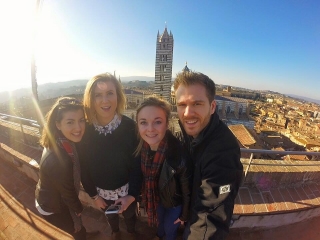
This is on top of ‘the arch’ alongside il duomo di Siena. Offers spectacular panoramic views of Siena and the surround tuscan countryside – Free to go up for Erasmus students with your student card! FYI, that’s Elliot’s on the right.
2: EXPLORE – Once you’ve got your map, I suggest picking a surrounding or neighbouring town/village each fortnight, research it a little, and make it your quest to explore it! Public transport does exist everywhere (even if it can be frustrating). Of course, prioritise getting to know the town/city you live in, but spread your wings – you’ll thank yourself later.
3: MAKE NATIVE FRIENDS – So, in Siena, we had a small local bar – called ‘Bella Vista’ for anyone interested. We befriended the girl who worked behind the bar – an incredibly outgoing Italian girl in her mid-twenties who lived in Siena. She happened to have a car, and this made point number 2 absolutely amazing for us. It also made number 1 slightly redundant for us… It also means that you are much less likely to fall into the English-speaking trap if you live with other English students. It’s just the best thing you can do to enhance pretty much ever aspect of your experience.
4: PACK LIGHT – Moving to France in September, I made a bit of a mistake. “France is nearby, let’s take a drive down with the parents and move in a completely full car-load of possessions.” No. It was a nice idea, and I did enjoy my 30” computer monitor and printer, but no. Obviously Italy isn’t the same – you’d have to be a bit of a fool to drive from England, but my point remains: having just one large suitcase and one hand luggage case is SO much better. I still had plenty of my clothes, and it meant that short trips were manageable and ultimately, moving back was stress-free – let’s just say that moving out of France involved much cardboard and duct tape… So pack light(er) people.

Our trip to Follonica – the nearest and prettiest coastal town to Siena. Can’t be without the beach, now!
5: BRAVE THE PAPERWORK – Okay, so it’s no secret that the administration of a year abroad is a bit of a nightmare. We all get frustrated as hell with it, but when you think of it, organising a year long exchange on a national scale is a tough job. Do your paperwork EARLY. Yes, you will probably have to print out and scan the same form around 3 times, and yes the office will be open at the stupidest of hours in France, but persevere because the simple fact is that you can get into all sorts of post-mobility trouble if you leave it late. Besides, you want that generous government money, too!
6: SPEND WISELY – If you can, think ahead and put money aside for your year abroad. Yes, you do get some money from Erasmus/government, but I want to stress how being in a new country presents you with SO many exciting opportunities. You want to be saying yes to as many things as possible, and many of them won’t be free. Italy was not expensive. In fact, my accommodation; the food; the drink… these were all impressively inexpensive compared to England. The only thing is that, because of this, you’ll want to experience dining out, having evening drinks, taking day trips etc. much more frequently. In a sentence: think about how to financially manage a lifestyle you’ll both enjoy and be able to maintain right up until your departure.
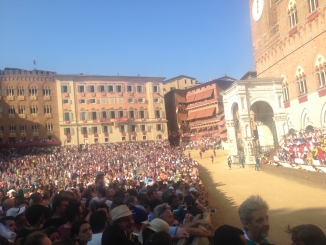
Palio Day in the Piazza del Campo, which is ram-packed with
spectators waiting for the horse race to commence. The build up to this 3-minute long race is electrifying.
Much of what I’ve written refers to the Year Abroad in general rather than specifically rather than Siena specifically. Anyone thinking about / preparing for / in Siena who would like more detailed information about my experience or advice, please get in touch with me. In the meantime, I hope that my photographs can to the talking with regards to my cool experiences and some of the great places I went. These include much drinking in the Piazza del Campo, road trips to lakes and, of course, the famous Palio. Bouna fortuna à tutti!
Modern Languages year abroad photo competition – winners 2015 (1)
This academic year, DAAD Lektorin Sandra Beer has organised a Modern Languages year abroad photo competition. The wonderful pictures of our students can be found on the departmental Facebook site and on Twitter. Three pictures were voted to be the best ones and this is what the winners tell us about their experience on their year abroad:
1st place Zara Al Naimi (French and English Literature)
 Hello, my name is Zara Alnaimi and I spent my year abroad in Angoulême, SW France, working as an English assistant in two primary schools. The town of Angoulême is relatively small although it is famous for La Bande Dessinée (BD) and is home to the celebrated BD festival which takes place every year. During my year abroad, I was living in accommodation with other assistants from all over the world. Although English was our common language, we tried to speak French as much as we could and regularly went to restaurants and the cinema to watch French films. We also enjoyed experiencing French life and eating as much cheese and bread as we could! On the weekends, we usually traveled around South West France to places such as Bordeaux, La Rochelle and Poitiers. The photograph I submitted for the year abroad competition was from a lovely day on the beach at La Rochelle. A particular highlight for me was hiring a car in France so we could all visit Bordeaux, and driving on the French motorway which was scary but enjoyable! As expected, I met many French people whilst I was abroad and this really improved my language skills.
Hello, my name is Zara Alnaimi and I spent my year abroad in Angoulême, SW France, working as an English assistant in two primary schools. The town of Angoulême is relatively small although it is famous for La Bande Dessinée (BD) and is home to the celebrated BD festival which takes place every year. During my year abroad, I was living in accommodation with other assistants from all over the world. Although English was our common language, we tried to speak French as much as we could and regularly went to restaurants and the cinema to watch French films. We also enjoyed experiencing French life and eating as much cheese and bread as we could! On the weekends, we usually traveled around South West France to places such as Bordeaux, La Rochelle and Poitiers. The photograph I submitted for the year abroad competition was from a lovely day on the beach at La Rochelle. A particular highlight for me was hiring a car in France so we could all visit Bordeaux, and driving on the French motorway which was scary but enjoyable! As expected, I met many French people whilst I was abroad and this really improved my language skills.

In terms of working as a language assistant, this was a very interesting experience: it really was a change from essays and assignments at university! Standing up in front of thirty children and teaching can be a very daunting experience, but once you get into the swing of things it is very rewarding. I really appreciated the children’s enthusiasm for learning English and it was enjoyable to create lesson plans for all the classes. Both of my schools have kept in touch since and it is so nice to hear how the children and teachers are getting on. Working as an assistant also gave me a sense of independence, adaptability and greatly improved my linguistic capabilities. I absolutely loved being part of the French culture and tried to make the most of my time abroad! Finally, I do miss France very much and my year abroad will always have a special place in my heart.


![20160211_112131 copy[2]](https://blogs.reading.ac.uk/mles/files/2016/02/20160211_112131-copy2.jpg)
![20160211_112537 copy[2]](https://blogs.reading.ac.uk/mles/files/2016/02/20160211_112537-copy2.jpg)
